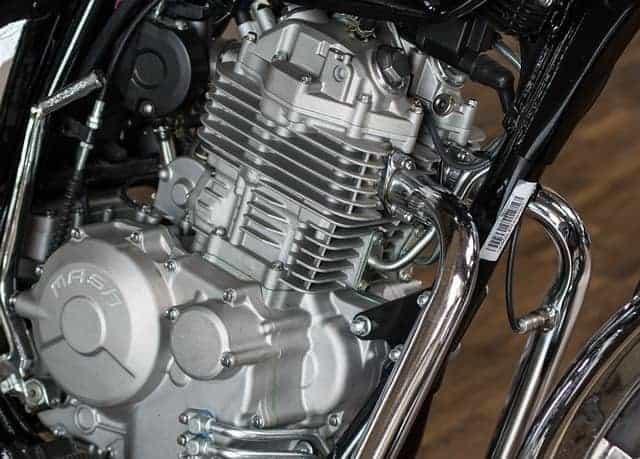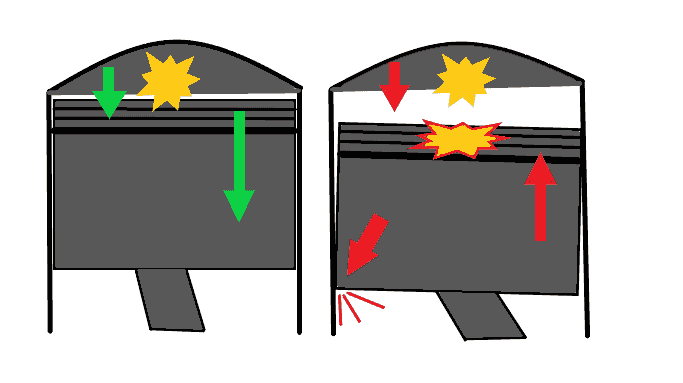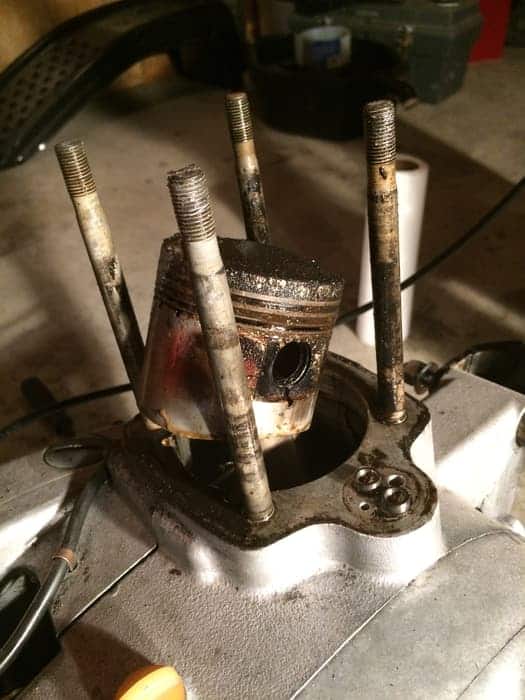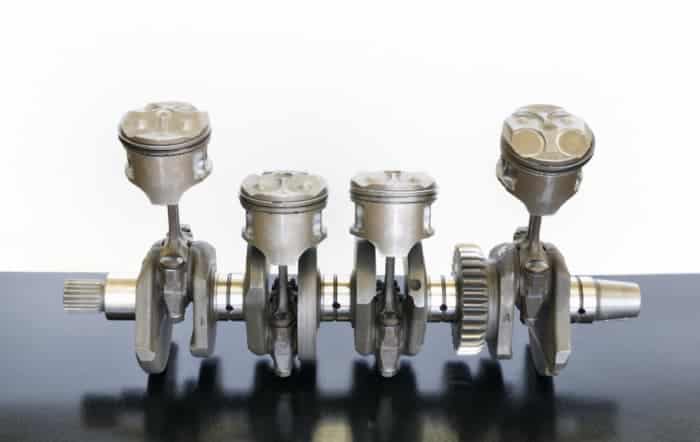
Troubleshooting motorcycle mechanical issues is usually pretty simple because of the low complexity level motorcycles have compared to other vehicles. A lot of these fixes are doable by the owners themselves.
But what about strange sounds coming from the engine? Motorcycle engine knocking is one sound that worries a lot of motorcycle owners and for good reason. Engine knocking is something that should never be ignored and should be promptly addressed.
Why is my motorcycle engine knocking? A motorcycle engine knock likely happens because of premature detonation. This makes the piston unable to reach the top of the cylinder and complete it’s cycle which causes the piston to move sideways and knock the side of the cylinder wall. A knocking engine can also be caused by a warped cylinder wall, valve tapping, or lateral moving bearings.
Having done over a dozen motorcycle restorations, I’ve dealt with a good amount of engines that knock. I’ve taken engines apart and rebuilt them myself. This is what I’ve learned and and I can explain the reasons your motorcycle engine is making that annoying knocking sound.
Premature Detonation
Premature detonation is the most common reason a motorcycle engine begins to knock. This can cause catastrophic damage to your engine. If you begin to hear a knocking sound coming from your engine, it’s really only a matter of time before it seizes if you don’t address it promptly. This is not a sound that will go away on it’s own.
To understand the term premature detonation, you’ll first need to understand how a four-stroke motorcycle engine works (most motorcycles have a four-stroke engine). Each chamber (or cylinder) has two valves, one for exhaust and one for intake. As the piston comes down during each cycle, the intake valve will open and suck in air. That’s what creates a vacuum that sucks in air and gas. Once those are sucked in, that valve closes so the chamber is sealed.
When that piston is pushing the gas and air back up, it’s creates pressure and compression and the spark lights off when the piston reaches the top. That detonation forces the piston back down and that’s what rotates the crankshaft which in turn gives power for the motorcycle to go.
That stroke where it comes up when both the valves are closed is called the compression stroke. Premature detonation occurs when the air and the gas ignite before the piston can get to the top. When this happens, the force and friction that ignition has pushes against what the piston is trying to do, so the piston is going to slightly turn sideways for a split second. When this happens, the side of the piston is going to hit the cylinder wall and you’ll begin to hear that knocking noise.

Even if you have a two-stroke engine on your motorcycle, this mechanism is still the same. There are several reasons why the engine can create a premature detonation.
The most common reason premature detonation happens in a motorcycle engine is due to spark plug timing. A lot of older motorcycles don’t have automatically advanced timing so you have to manually adjust the points so the timing is correct; otherwise your spark plugs will be sparking before the piston gets to the top of the cylinder and will tap the side. This is also known as spark delay.
You can also get spark delay from an incorrect gap size on a spark plug. This means the gap on the end of the spark plug is too close together.
A motorcycle running lean can also cause a premature detonation inside your motorcycle engine. When an engine runs lean, that means the air to fuel ration is off and there’s either not enough fuel or too much air. This can create extreme heat inside the engine which leads to detonation before the cylinder gets to the top of the cylinder.
If you have dirty cylinders, meaning if there are carbon deposits that have developed either at the top of the piston or the bottom of the valves, this can also cause premature detonation. These deposits are usually a brown-ish black color.

These deposits can get extremely hot. As soon as the fuel squirts in and the piston comes up, that extreme heat from the deposits will prematurely ignite the fuel causing the piston incapable of reaching the top of the chamber. You can think of the carbon deposits as burning embers; they’re unintentionally doing the job for the spark plugs but not doing it at the right time.
Lastly, low octane fuel can be a reason a motorcycle engine is experiencing premature detonation. If you have a high compression ratio engine (which most motorcycles do), then you should be using premium gas. The low octane fuel pressure of squeezing the air and fuel together can ignite with no heat. Pressure alone can ignite the fuel. Your engine needs a fuel that can withstand that pressure.
As a rule of thumb, you should always use premium, higher octane fuel that is ethanol-free no matter what kind of motorcycle you have. Motorcycles usually get better gas mileage and it doesn’t take much to fill the tank, so this should only cost you a few extra dollars. For more information about the type of gas motorcycles should use, see my other article by clicking here.
Warped Cylinder Wall
Another possible cause for a motorcycle engine to knock is a warped cylinder wall. It is possible for the cylinder wall to become warped and slightly misshapen. The affects of this will be similar to premature detonation but timing isn’t the issue, rather the piston has an obstacle it can’t overcome.
In order for the piston to move up and down to provide power to the motorcycle, the cylinder wall has to be completely straight and smooth. Any type of warp will cause the piston to struggle getting all the way to the top of the cylinder and complete it’s stroke. Again, the forces of the piston trying to move up but working against some other force will cause the piston to slightly go side ways for a split second and knock on the cylinder wall.
This is usually caused by the engine overheating. The metal on the overheated engine will begin to warp, expand, and misshape because of the extreme heat it’s experiencing. This happens either when the engine is working too hard, there is a lack of coolant (on water cooled bikes), or there isn’t enough oil to lubricate the parts of the engine.
It’s also possible for the engine to have been rebuilt incorrectly if you had that done recently. As reliable as most mechanics are, it may have been machined poorly while they were working on it and the cylinder wall isn’t smooth. This is called an out-of-round cylinder wall.
Valve Tapping
Almost all modern motorcycle engines are called interference engines. This means that if the valve is open, the piston is going to hit it. This is why adjusting timing or replacing the timing chain correctly is so important. If the valve is open just a little bit too much and the piston comes up, it’s going to slam into that valve and bend it. The valve coming down and roughly touching the top of the piston is what makes the knocking or tapping sound you may be hearing.
It’s also possible for the valves to be slightly open when detonation occurs which causes that valve to slam shut prematurely because the ignition that’s happening underneath the valve is forcing it to do so (which can also be caused by premature detonation). The valve slamming shut will also cause that knocking or tapping sound in your motorcycle engine.
Valve knocking is caused by the timing being off, even by just one tooth. Motorcycles have timing just like cars do but most of them have chains instead of belts. This is usually located underneath the bottom left side cover of the engine and likely goes around the stator.
This type of engine knocking isn’t something that spontaneously happens. This is only caused if you’ve opened up the side cover where the timing chain is located, removed the chain and replaced it, or recently had it worked on.
Bottom End Knock From Bearings

There is a crankshaft and a crankshaft bearing on the lower half of a motorcycle engine. The bearing is a circle and inside that circle is a smaller circle (think like a fidget spinner) and the inside of it spins freely.
The engine will have a bearing along the crankshaft and that’s what allows the arms to spin. If one of those bearings starts to go bad, it can allow a little bit of lateral or sideways movement as the piston goes up and down and the bearing can cause the knocking sound.
The main cause of the bearings in a motorcycle engine to knock is usually due to age, though this type of engine knock is a lot less common that the previous ways mentioned. If you have an older motorcycle and notice a knocking sound coming from the lower half of the engine, this could your culprit.
This can also be caused by the engine overheating. Again, the extreme heat the engine may be experiencing can warp some of the metal parts inside which could ultimately cause the bearing to malfunction if it isn’t perfectly straight and aligned.
Lack of lubrication can also cause a bottom end knock in your motorcycle. The friction that can build up between the crankshaft and the crankshaft bearing can cause some major damage if there’s not enough lubrication happening throughout the mechanism. This is also a lot more of an expensive fix because a bottom end engine restoration is a lot more labor intensive than a top end engine restoration.
On the flip side, an excess amount of oil can also cause a bottom end engine knock. Too much oil means too much oil pressure which puts stress on the crankshaft.
I once was riding with an engine that had too much oil in it. It had the wrong dipstick inserted from the previous owner (it was too short). Oil was added to reach the “correct” level according to the dipstick which meant too much oil was added. A bottom end knock started happening which I ignored for just a few minutes. Before I knew it, the engine blew and threw several rods. The engine essentially looked like a piece of swiss cheese.
What To Do About An Engine Knock On Your Motorcycle
Hearing an engine knock coming from your motorcycle is never a good sign. Some of the reasons it has happened could have been prevented, but once it has started happening there’s potential damage that has already been done to your engine. There’s likely some sort of fix you’ll have to make in order to ensure it’s full functionality.
An engine knock should always be promptly addressed. As soon as you hear that dreaded knocking or ticking sound, immediately turn off your motorcycle and do not turn it on until you feel the issue has been fixed. Never ride it to the shop in this condition.
How you fix your knocking engine fully depends on your level of experience with motorcycle engines. You can always start with the easier things that could be the cause suitable for beginners to fix. Such fixes will include checking the spark plug gap on each spark plug to make sure the gap is at the correct distance. A lot of people don’t understand that when you buy new spark plugs, you need to set the gap at a certain distance; they don’t come stock at the distance your motorcycle needs.
There are simple tools that can help you do this in a matter of minutes. I usually use a spark gap gauge which looks similar and is the about the same size as a half dollar coin. You can find these at any auto parts store and costs about $2. Check your owner’s manual to find the correct distance your spark plugs need to be at.
Check the level of your motorcycle oil and change it if needed. Make sure there is the correct amount of oil added, meaning there isn’t too much or too little.
As it was mentioned before, premature detonation can be caused by a motorcycle running extremely lean. The signs of a motorcycle running lean include the motorcycle running sluggish, hotter than normal exhaust pipes, and the spark plugs having little, if any, wear on them. See my article here to learn more about how to tell if your motorcycle is running lean.
If you have a lean running engine, you’ll need to adjust your carburetor. This is usually done by turning a screw on the side of it which adjusts the mixture it gives to the engine.
You can also check in on the timing of the motorcycle if you know how to do it. This includes accessing the points as well as the crankshaft and using a series of tools to test the timing. If any of that sounds unfamiliar to you, it’s probably best you leave this test to a mechanic.
In all other cases, it’s best to take your motorcycle in to a professional mechanic and have them fix it for you. I am all about doing DIY fixes on a motorcycle, but engine fixes are something I don’t want to toy with if I know it’s over my head. Any small mistake could cost the life of the engine and a lot of money on your part.
How To Prevent The Engine Knock
Preventing the engine knock from happening to your motorcycle should be fairly easy. The answers are all in how well you maintain your bike (unless the problem was caused by a careless mechanic who didn’t do their job right).
Make sure to always use premium, high octane, ethanol-free gas in your motorcycle. Your motorcycle is saving you a lot of money on gas mileage, so it’s only reasonable to put in the best gas that it needs.
Routine oil changes are always a must. Just because you don’t ride your motorcycle very often doesn’t mean you don’t need an oil change very often either. Your oil should be changed every 4,000 – 5,000 miles or every six months, whichever comes first. See my article here to learn more about how often you should get your motorcycle serviced.
Proper spark plug gaps and a fully functioning carburetor is always a given. Maintaining good engine temperature is a major way to prevent an engine knock. If you have a water cooled engine, stay on top of coolant levels. If you have an air cooled engine, stay conscious of how hot your engine may be getting if you’re going high speeds or idling in traffic on a hot day.
You should also get a tune-up every two years. This will include a timing adjustment. Staying on top of the timing is one of the best ways to prevent a motorcycle engine from knocking since a lot of the reasons it happens in the first place are caused by timing issues.

